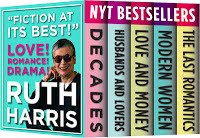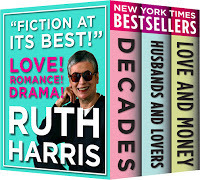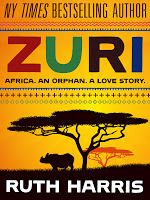Has Publishing Become a Kinky Game? Ruth Harris Talks about Writer Masochism and How to Cure It
I have to admit that when Ruth Harris first talked to me about “writer masochism,” I cringed.
 Ruth's new boxed set: 20th Century Women!I realized she was describing me.
Ruth's new boxed set: 20th Century Women!I realized she was describing me.Not so long ago, I fell so deeply into the writer-masochism pit, I couldn’t see a way out. I gave exclusives, signed onerous contracts, accepted puerile assessments of my work as gospel truth, and spent years feeling powerless and unworthy, begging for any publishing professional to let me lick his/her kinky boots.
And I’m not alone. The story of most writers’ forays into the dark world of publishing can read like a metaphorical Story of O.
Worst of all, a lot of writers tend to shame and bully each other into playing the assigned submissive role. I realize now the BDSM rule-enforcers were partly responsible for the nasty attacks I got when I tried to tell my fellow Boomers not to be afraid of writing Amazon reviews (More on Boomers’ fear of tech in a great post by Jane Friedman this week.)
After I wrote that, the self-appointed Writing Inquisition let loose the full force of its self-righteous fury, trashing my Amazon buy pages, vilifying me on forums, telling me I'd never sell a book in this Internet again--even emailing me death threats (Seriously. Some of these people had major mental health issues.) All because I told authors’ fans that Amazon reviews empower readers so they no longer have to play a submissive role to the publishing establishment. Heresy!!
Here are some quotes from the diatribes I got from the Writer-Masochists:
“Authors should never pay attention to reviews or book rankings. They should write for the pleasure of writing.” “Once I release a book, I truly release it. I cannot control if it's read, how it's reviewed, if it's reviewed, etc. and that's fine by me.” “Why would you read your own reviews? It’s none of your business if anybody likes your book.” “Authors who track their sales are narcissistic.” “It is unethical in all cases for friends or family members to review your book.” “I would never write to make money. You disgust me.” Can you imagine those things being said to members of any other profession?
“How dare you talk about billable hours, Ms. Lawyer! You should be practicing law for the pleasure of it!” “Once I finish a painting, I throw it out in the street. When it comes to selling my work, I am ignorant and powerless, and that’s fine with me.” “Why would a teacher read his class evaluations? It’s none of your business if your students are satisfied.” “Performers who pay attention to ticket sales are narcissistic.” “It is unethical for Real Estate/Insurance agents/stockbrokers/Avon ladies to sell to family and friends.” “I would never practice medicine for money. Doctors who expect to be paid disgust me.”
The sad thing is most of these quotes were from WRITERS. (I didn’t include the obscene and violent ones, because I deleted them right away. Sometimes I wish I’d kept them for proof of the extremes of writerly loonitude.)
Most of the above dogma is intended for published authors. But the rules for the Great Unpublished are just as bad. Maybe it’s not entirely a coincidence that our communications with the industry are called “submissions.”
How many times have you been told—
Don’t call us; we’ll call you.Learn patience: Expect us sit on your manuscript for several years with a 99% chance we’ll reject it. But it has to be an exclusive, so you can’t submit to anybody else during those years. I’ll only consider this if you remove all your gay/abused/racially-diverse characters and spend a year rewriting it as a Christian-thriller/vampire-werewolf-romance/post-apocalyptic-zombiefest—with no guarantee of representation.If you don’t hear from us in the next 6 months, it’s probably a no. But we won’t bother to tell you, even though we require paper submissions with an SASE. (What do they do with all those SASE’s, do you suppose?)You didn’t/did use italics/Oxford commas/Courier font, so it’s an automatic no. My 13-year-old unpaid intern says the plot/characters are too complex. (Speaking of abuse—what’s this with the unpaid-intern child-labor stuff?)Yes, last week I did say the query process is the best way to learn about the publishing business, and I still think it is. Not all agents and publishers are sadistic bullies. But when you go through it—remember you have choices. Don’t let the Inquisitors tell you it’s your duty to submit to abuse.
NOTE: This post is NOT telling everybody to run out and self-publish immediately in order to avoid masochistic behavior.
Ruth is saying the self-publishing revolution is turning the tables. Because of the massive changes brought about by the e-book, writers now have choices we’ve never had before. Because we now have the choice to walk away, publishers are going to have to learn respect or lose out.
Ruth has been on both sides of the publishing game: a NYT bestselling author and a Big Six editor. She knows what she’s talking about.
So any time you’re told it’s your duty to fall on your knees and obey your publishing masters, answer back: “NOT ANY MORE!
WRITER MASOCHISM: THE ROOTS, THE CAUSES, THE CURE by Ruth Harris
 I’ve seen it in myself, in other writers (even mega bestselling writers), in writers trying to get established—a learned masochism. In publishing the inevitable vulnerabilities and insecurities every human being is born with become the leverage by which publishers for several decades have ruled with an iron-fisted upper hand. WM is the reason publishers have been able to get away with screwing writers for so long: the shabby treatment, the unfair contracts, the declining advances, the pathetic royalty rates, and incomprehensible royalty statements.The writer-publisher relationship used to be much more equal. Paperbacks were sold in every drugstore, grocery store, supermarket, even in gas stations. To fill those almost-omnipresent racks, publishers needed writers & the work they created. There were lots of markets, lots of genres were routinely published, and editors & writers were colleagues who worked together coming up with new ideas or new twists on old ideas.More contracts were signed, more books were published and sold, more writers were able to make a living. When that massive distribution went away, publishers no longer needed to fill the racks and were no longer so dependent on writers. A complete power switch occurred in which the writer lost and became the beggar shaking his/her alms cup hoping for a crumb, a penny, a kind word.Over time, the writer was placed in the position of the relentlessly abused, rejected, criticized and undermined child—even though the parent (the publisher) would aver how much they “loved” you. Out of that unequal relationship a demon’s brew of writer masochism flowered.No matter what happened, every book that didn’t sell up to expectations—basically just about every book published—was ALWAYS the writer's fault.Never mind that the ad/promo/pub budget ranged from miniscule to non-existent.· Or that the one meager ad (that’s if you were lucky enough to get an ad) buried Allah-knows-where was, shall we say?, massively inadequate to the results expected.· Or that the cover had nothing to do with book.· Or that books weren't in bookstores even as the writer (me & plenty of others) was damn near killing herself/himself touring.· Or that no one bothered to use rave reviews to stir up excitement and interest. Those raves were just filed away to languish in oblivion, never to see the light of day.· Or that suggestions a writer (who you’d think might know a thing or two about her/his own book) made about how to sell her/his book were ignored.· Or that books—even books for which publishers competed & willingly paid large advances—were regularly published in secret, spine out somewhere in the back of the store on a bottom shelf next to the men’s room.Nope. Blame the writerThe book didn't sell so it must have sucked—even if the publisher willingly, eagerly paid a lot of money to acquire it. Even if the reviews were spectacular. Even if book clubs, paperback publishers, foreign publishers, and movie companies spent beaucoup to acquire the rights. In fact, by selling off sub rights and thus recouping the amount of the advance, publishers had even less motivation to aggressively sell the book in question.The publisher’s solution to the lackluster sales: Move on to the next book, the next writer. Then blame that one, too.And what did writers take away from the downbeat response, the blaming, the phone calls that weren’t returned, the memos containing suggestions or requesting information that were never answered? They became prisoners of the Stockholm Syndrome. Writers began to feel that the criticism was deserved, the disappointment was their fault, and that the way to a more rewarding outcome was to write a better book next time. Except, of course, that no one knew exactly what a “better book” was.I have never once heard a publisher of mine (or anyone else’s) ask what they could have done differently or admit in any way that their publishing effort had been lacking. When several of my books hit the New York Times bestseller list, the response was not pride or pleasure. It was a pout: “But it didn’t sell as much as we thought.”THE CURE: take control—and responsibility. With the advent of e-publishing, a second huge switch has taken place, this time, with the power going back to the writer. Now it’s publishers who are feeling threatened and being undermined. We hear the howls, we see how much they like it (NOT!) and how desperate they feel—just the way writers used to feel (because, back then, back in the bad old days, writers were the ones with no power and no choice).********What about you, scriveners? Have you ever been urged to practice masochistic behavior by publishing professionals or fellow writers? Have you ever got to the point where you believed writers deserve to be abused? Have you ever fought back?
I’ve seen it in myself, in other writers (even mega bestselling writers), in writers trying to get established—a learned masochism. In publishing the inevitable vulnerabilities and insecurities every human being is born with become the leverage by which publishers for several decades have ruled with an iron-fisted upper hand. WM is the reason publishers have been able to get away with screwing writers for so long: the shabby treatment, the unfair contracts, the declining advances, the pathetic royalty rates, and incomprehensible royalty statements.The writer-publisher relationship used to be much more equal. Paperbacks were sold in every drugstore, grocery store, supermarket, even in gas stations. To fill those almost-omnipresent racks, publishers needed writers & the work they created. There were lots of markets, lots of genres were routinely published, and editors & writers were colleagues who worked together coming up with new ideas or new twists on old ideas.More contracts were signed, more books were published and sold, more writers were able to make a living. When that massive distribution went away, publishers no longer needed to fill the racks and were no longer so dependent on writers. A complete power switch occurred in which the writer lost and became the beggar shaking his/her alms cup hoping for a crumb, a penny, a kind word.Over time, the writer was placed in the position of the relentlessly abused, rejected, criticized and undermined child—even though the parent (the publisher) would aver how much they “loved” you. Out of that unequal relationship a demon’s brew of writer masochism flowered.No matter what happened, every book that didn’t sell up to expectations—basically just about every book published—was ALWAYS the writer's fault.Never mind that the ad/promo/pub budget ranged from miniscule to non-existent.· Or that the one meager ad (that’s if you were lucky enough to get an ad) buried Allah-knows-where was, shall we say?, massively inadequate to the results expected.· Or that the cover had nothing to do with book.· Or that books weren't in bookstores even as the writer (me & plenty of others) was damn near killing herself/himself touring.· Or that no one bothered to use rave reviews to stir up excitement and interest. Those raves were just filed away to languish in oblivion, never to see the light of day.· Or that suggestions a writer (who you’d think might know a thing or two about her/his own book) made about how to sell her/his book were ignored.· Or that books—even books for which publishers competed & willingly paid large advances—were regularly published in secret, spine out somewhere in the back of the store on a bottom shelf next to the men’s room.Nope. Blame the writerThe book didn't sell so it must have sucked—even if the publisher willingly, eagerly paid a lot of money to acquire it. Even if the reviews were spectacular. Even if book clubs, paperback publishers, foreign publishers, and movie companies spent beaucoup to acquire the rights. In fact, by selling off sub rights and thus recouping the amount of the advance, publishers had even less motivation to aggressively sell the book in question.The publisher’s solution to the lackluster sales: Move on to the next book, the next writer. Then blame that one, too.And what did writers take away from the downbeat response, the blaming, the phone calls that weren’t returned, the memos containing suggestions or requesting information that were never answered? They became prisoners of the Stockholm Syndrome. Writers began to feel that the criticism was deserved, the disappointment was their fault, and that the way to a more rewarding outcome was to write a better book next time. Except, of course, that no one knew exactly what a “better book” was.I have never once heard a publisher of mine (or anyone else’s) ask what they could have done differently or admit in any way that their publishing effort had been lacking. When several of my books hit the New York Times bestseller list, the response was not pride or pleasure. It was a pout: “But it didn’t sell as much as we thought.”THE CURE: take control—and responsibility. With the advent of e-publishing, a second huge switch has taken place, this time, with the power going back to the writer. Now it’s publishers who are feeling threatened and being undermined. We hear the howls, we see how much they like it (NOT!) and how desperate they feel—just the way writers used to feel (because, back then, back in the bad old days, writers were the ones with no power and no choice).********What about you, scriveners? Have you ever been urged to practice masochistic behavior by publishing professionals or fellow writers? Have you ever got to the point where you believed writers deserve to be abused? Have you ever fought back?Update: Family Therapist Sandy Nathan has written a companion piece to this post on her blog, Your Shelf Life--explaining why the lack of balance in the publisher/author relationship can be hazardous to your mental health.
 Ruth has more book news! She has two new boxed sets: A three-book set of the 20th Century Woman and a five book set that includes two more of her NYT bestsellers (and hit the top five in the recent history Kindle bestseller list this week.) And remember that ZURI is coming soon….
Ruth has more book news! She has two new boxed sets: A three-book set of the 20th Century Woman and a five book set that includes two more of her NYT bestsellers (and hit the top five in the recent history Kindle bestseller list this week.) And remember that ZURI is coming soon….
Published on April 29, 2012 09:35
No comments have been added yet.



